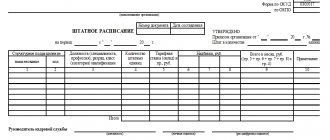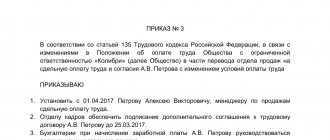What are the current standards for positions and professions?
In accordance with Art. 57 of the Labor Code of the Russian Federation, a mandatory condition of an employment contract is to indicate the employee’s labor function. It refers to work in a position, specialty, profession, or a certain type of work entrusted to an employee.
In Art. 195.1 of the Labor Code of the Russian Federation states that qualifications mean the level of skills/knowledge, work experience and professional skills of an employee. At the same time, a professional standard is a detailed description of the qualifications needed to engage in a specific professional activity. That is, this means that a professional standard is not a description of the characteristics of a position - it is more a set of requirements that applies to a certain type of professional activity.
In this regard, it is not surprising that there may be discrepancies between the names of positions according to professional standards and those specified in the employment contract.
A complete list of currently approved professional standards can be found in the special ConsultantPlus material, having received trial access to the system.
Categories of state civil service positions
Current legislation allows us to distinguish the following categories:
- Heads (and their deputies) of state bodies and their structural divisions, who are either appointed for a certain period of time or have no restrictions on the terms of their activities. They have broad administrative and administrative powers, the right to issue regulations and mandatory orders.
- Assistants (advisers). Their main function is to provide comprehensive assistance to politicians - persons holding government positions and heads of government agencies. A fixed-term service contract is concluded with this category - when their boss leaves, they also leave.
- Specialists. These are citizens whose essence of work is to professionally ensure that government bodies fulfill the functions and tasks assigned to them. This category has no term limits and receives work based on the results of a competitive selection.
- Supporting specialists. They are engaged in organizational, informational, documentation, financial, economic and economic support for the activities of government agencies. That is, unlike the previous category, these specialists perform auxiliary rather than professional functions. They work on a general basis, without any time limits.
How to bring positions into line with professional standards?
Not every employer is required to strictly follow professional standards.
Want to know the answer to this question? Get free access to K+ and go to the material.
To transition the company to professional standards, a working group is created, whose primary responsibilities include finding out whether all the necessary professional standards have been adopted that can be correlated with the types of professional activities at the enterprise.
To do this, you should compare all the positions listed in the staffing table in terms of the job function performed with already approved professional standards. It is worth deciding which professional standard the description of a particular position may fall under. It may be necessary to study several professional standards that are similar in content in order to choose the one most suitable for the description of the existing position at the enterprise.
To make such a comparison, it is worth first of all paying attention to studying the main purpose of professional activity, which is necessarily given as part of the general information of any professional standard - this can be clearly seen in the layout of the professional standard, approved by order of the Ministry of Labor of the Russian Federation dated April 12, 2013 No. 147n. The description of the goal recorded in the professional standard should be compared with the goal of working in a specific position prescribed in the corresponding job description of the enterprise.
In the layout, you should also look at the information located in the column under the heading “Group of occupations” - it will serve as an additional pointer when searching for a professional standard that matches the job description.
At the same time, it must be borne in mind that the title of the position according to the professional standard may not coincide exactly with the title of the position provided for at the enterprise. Therefore, if a suitable professional standard was not found by its exact name, one should not assume that no suitable professional standard is provided for a position existing in the staffing table.
Granting the right to sign documents to other persons
In the practical activities of organizations, there is often a need to grant the right to issue (sign, approve) documents to certain officials in situations that are not regulated by the local regulatory legal acts in force in the organization.
For example, in the charters of organizations, the right to issue (sign, approve) administrative, financial, and contractual documents, as a rule, is assigned to the manager. Consequently, in order to implement the tasks and functions assigned to the organization in the event of a long-term absence of the manager (vacation, business trip, etc.) or for other reasons (for example, the need for rational organization of work), another person (persons) must be granted the corresponding rights.
Granting the right to issue (sign, approve) documents is carried out by delegating the relevant powers. The Instructions on Office Work and other normative legal acts of the Republic of Belarus on office work do not directly provide for the possibility of delegating authority to issue (sign, approve) documents (in clause 15 and clause 57 of the Instructions on Office Work this issue is regulated indirectly). At the same time, in the legislation of the Republic of Belarus this concept is used in the sphere of regulation of rule-making activities. For example, part 4 of Art. 14 of the Law of the Republic of Belarus of January 10, 2000 “On normative legal acts of the Republic of Belarus” (with subsequent amendments and additions) established the possibility of delegating to the President of the Republic of Belarus the authority to issue decrees on the basis of the relevant law.
Part 13 of clause 57 of the Instructions for Office Work stipulates that the “Signature” detail, as well as the “Approval stamp”* and “Approval stamp” details indicate the actual position of the person who signed (approved, approved) the document, his initials and surname. This rule is aimed at regulating the execution of the specified details when granting (delegating) the right to sign (approval, agree on) documents, incl. in the temporary absence of an employee authorized to sign documents (the head of the organization, the chief accountant, etc.).
* For approved documents, an additional requisite that gives them legal force is the requisite “Approval stamp” (author’s note).
The procedure for delegation by the head of the organization of authority to issue (sign, approve) documents to other officials of the organization is not directly established by the legislation of the Republic of Belarus. At the same time, according to the norms of clause 15 of the Instructions for Office Management, the delegation of relevant powers must be enshrined in the local legal act of the organization.
In practice, this norm can be implemented in two ways, depending on the organizational and legal form of the organization and the principle of its management (collegiality or unity of command).
According to Art. 186 of the Civil Code for representation before third parties, one person (including legal entities) is issued a power of attorney to another. A power of attorney on behalf of a legal entity is issued signed by its head or another person authorized to do so by its constituent documents, sealed with the seal of this organization. Since a power of attorney involves the representation of the interests of one person by another before third parties, powers of attorney are usually issued to resolve issues and the right to sign documents of a contractual nature. A number of organizations use the practice of issuing powers of attorney for the right to manage the organization as a whole, with the ensuing authority to issue (sign, approve) other documents, incl. administrative and financial.
What to do if a discrepancy is detected?
In the event that work in a certain position is associated with the provision of benefits/compensations or there are restrictions on it, it is necessary that the employment contract of this specialist indicate the name and requirements that are contained in the professional standard or in the qualification directory (Article 57 of the Labor Code). At the same time, there may be discrepancies in the title of the position in the reference book and in the professional standard.
If a dispute arises for this reason, it is better to resolve it through discussion at a meeting of the working group, which was created to introduce professional standards at the enterprise. The decision made is documented in a protocol. This safety net will protect you in case of an audit if a discrepancy between the “preferential” position and the name specified in the professional standard is discovered.
You can read about the creation of a working group in our article “Regulations on the working group on the implementation of professional standards.”
Let's consider a number of situations that may arise in practice:
- If the position does not provide any benefits or restrictions, then its name may not coincide with the professional standard, since in this case its implementation is not necessary.
- If the title of the position still needs to be brought into line with the professional standard, then it is necessary to introduce a new position that has the same name as provided in the professional standard. The previous position must be excluded from the staffing table, and the employee himself, with his consent, must be transferred to a new position, making an entry in the work book and personal card.
- If the employee does not agree with such a transfer, he will have to terminate the employment contract with him through the staff reduction procedure, since the new staffing table will exclude positions that are not contained in the professional standard or in the qualification directory (Part 1 of Article 74 of the Labor Code).
IMPORTANT! The unilateral transfer of an employee to a new position is not permitted. It is also worth keeping in mind that an employee cannot be fired solely on the grounds that his knowledge/qualifications do not meet the professional standard.
Features of using job titles in the staffing table
Considering that, as of 2020, no uniform rules have been developed at the legislative level for the formation of job titles, and professional standards must be observed only under certain working conditions and in government agencies, many companies select job titles based on their own rules.
They are as follows:
- a prestigious name to increase motivation;
- a long name in order to specify the assigned duties;
- an arbitrary name for the sake of fashion and Western trends.
For example, at the moment the position of manager is quite common and prestigious. Under it you can veil less resonant professions, for example, the same cleaner who, having become the manager of a cleaning service, will not stop washing floors and wiping dust, but will receive an additional reason to be proud of her position, and therefore an incentive to develop.
Or, due to a small staff, one employee can occupy two positions. For example, this could be a deputy director - head of a department. Thus, two jobs are combined, and, accordingly, responsibilities in one full-time instruction, but with more extensive powers.
Some companies practice naming positions using letters of a foreign alphabet. For example, the following option is used - IT manager.
Basic principles of selection
The stated rules are not always correct. They violate both the norms of the current legislation and the rules for forming job titles in accordance with subordination.
The following principles should be followed:
- The first is the correspondence of the name of the category to the staff hierarchy, which can be chosen arbitrarily, but taking into account the subordination.
- The second is the correspondence of the job title to the duties performed.
- The third is the application of the law.
Thus, the Decree of the Government of the Russian Federation No. 225 in paragraph 6 of the Instructions for filling out labor books states that the labor book is filled out only in the state language, which is Russian on the territory of the Russian Federation.
Decree of the Government of the Russian Federation of April 16, 2003 N 225
Accordingly, it is prohibited to enter job titles in English or other languages. But when applying for employment, the name of the vacancy must be indicated, so the norms of the law in the case of an IT manager will be violated.
The procedure for renaming a position in the staffing table is in our article. How to make an extract from the staffing table? Find out here.
Basic and derivative variants
Considering that there are quite a lot of job titles, they are divided into types:
- basic;
- arbitrary.
The basic names are those specified in the Qualification Directories. But names can be arbitrary, derived from the basic ones or invented independently.
Naturally, if there is a basic name, problems do not arise, since its basis is regulated by the ETKS. But in connection with the use of arbitrary names, questions may arise in determining the right to early pension provision.
Clause 9 of Resolution of the Ministry of Labor of the Russian Federation No. 29 provides an explanation on this matter. According to it, derivative job titles, which include basic titles, can be recognized as basic and provide the employee with the right to receive benefits.
Resolution of the Ministry of Labor of the Russian Federation of May 22, 1996 N 29
For example, the profession of battery operator is included in the ETKS, but senior battery operator is not, while the nature of the work and the hazard code corresponds to the first name, which automatically gives the right to benefits established by law.
If the arbitrary name does not contain the base name, then it will be difficult for the employee to claim any benefits. Therefore, when calculating a pension, the length of service in the specified position will be counted as general and no more.
That is, if the company is engaged in a general field and there are no hazardous conditions at the workplace, you can use arbitrary names, but if the hazard code is 3.1, the name of the profession must have at least a basic name.
Rules for using individual words
The qualification directory contains many job titles, most of which consist not of one word, but of several.
For example, a forklift driver or a refrigeration unit charger. That is, the law allows the name of a profession consisting of several words containing clarification of a certain type of activity.
The law also allows the use of prepositions in job titles that act as a connection between several words - for example, a laboratory assistant in ultrasonic technology or a preserver of equipment and metal products, which again implies a very wide range of different phrases.
There is no legal limit on a certain number of words in job titles, given that some industries may have quite long names that will also appear in vacancies.
Thus, fairly broad titles are currently common in the field of government agencies, where the following positions are present:
- economist in accounting and analysis of economic activity;
- Leading specialist in contract and claims work.
That is, there are no restrictions on the number of words and the use of prepositions to form logical phrases in job titles at the legislative level, given that the specified aspects are present in the names of professions in the ETKS.
Find out how to properly create a staffing schedule. What is the difference between staffing and staffing? See here.
One more aspect should be noted.
According to the Qualification Handbook, additional words to basic titles such as director or secretary are used to clarify the powers and duties performed.
For example, a secretary can only deal with office work, but a secretary-typist will be busy preparing administrative and other documentation.
Accordingly, the director will be directly involved in the management of the company, but the executive director will have authority only in one of certain areas.
Results
When checking whether the job title from the staffing table corresponds to what is enshrined in the professional standard, you should pay attention to whether the company is required by law to comply with this clear match. In the event that the employer is obliged to follow professional standards, a new position name (from the professional standard) will need to be added to its staffing table and the old one will be deleted, in which case the employee’s voluntary consent to be transferred to a new position will be required, or he will have to resort to termination of the employment contract with the payment of compensation and provision of guarantees upon dismissal due to staff reduction.
Sources:
- Labor Code of the Russian Federation
- Order of the Ministry of Labor of the Russian Federation dated April 12, 2013 No. 147n
You can find more complete information on the topic in ConsultantPlus. Full and free access to the system for 2 days.
Enter the site
RSS Print
Category : Staffing and salaries Replies : 440
You can add a topic to your favorites list and subscribe to email notifications.
« First ← Prev. ...Next. → Last (45) »
| twiggy |
| Please help me figure it out: the director plans to hire a new employee part-time and assign him the position of brand manager (since his responsibilities will include promoting the brand of our foreign supplier). There is no such unit in the current staffing table, we will specifically introduce it... but, firstly, I can’t find such a name in the ECSD directory, maybe it should be called something else, maybe there are other options? In addition, if I understand correctly, “manager” means that there should be 2 people subordinate, and the new employee will work alone for now... it’s only in the future that we will select a team for him.. In general, I’m quite confused I'm confused...I would be very grateful for your help |
| I want to draw the moderator's attention to this message because: Notification is being sent... |
| tikhan [email protected] Novogrudok Wrote 6516 messages Write a private message Reputation: 1846 | #2[283017] May 17, 2011, 13:15 |
twiggy wrote:
I can’t find such a name in the ECSD directory, maybe it should be called something else, maybe there are other options?
and you won't find it.
There is only a manager. However , Scroll: DECISION OF THE MINISTRY OF LABOR AND SOCIAL PROTECTION OF THE REPUBLIC OF BELARUS March 30, 2004 No. 32 On approval of the structure and General provisions of the Unified Qualification Directory of Employee Positions
4. Basic job title – the main job title provided for by the OKPD and determined by the established standard types of work (job responsibilities).
Full job title
– a specific job title that specifies the nature of the job function performed by the employee.
It is established by adding additional information to the base name, as well as derivative positions provided for by the OKPD. In this case, the corresponding addition can be placed either after the base name or before it.
In all cases, the employee’s position is assigned its basic name according to the OKPD (for example, director, manager, engineer, economist, etc.), for which the ECSD provides a qualification characteristic, and, if necessary, the full name of the position (for example, first deputy director, manager HR, labor protection engineer, leading pricing economist, etc.). At the same time, the words provided in the job title that specify the place of work, field of activity, specialty, etc., including those in parentheses, can be used independently when the employer establishes a specific job title. For example, the OKPD code 22765 includes the title of the position “Instructor-methodologist for physical education, health, sports and mass work of an enterprise, institution, organization, collective farm, state farm.” In this case, the employer has the right to establish a specific title for the position “Instructor-methodologist for physical education and recreational work,” “Instructor-methodologist for physical education and recreational work at the state farm,” etc.; under code 21325 the title of the position “Director (manager) of pharmacy organizations (pharmacy, pharmacy warehouse, base, etc.)” is included. In this case, the employer has the right to establish specific job titles for the heads of these organizations: “Pharmacy Director” or “Pharmacy Manager,” etc. The job title of a particular employee may reflect: the nature of the work he performs, regardless of the specialization of the organization or department in which he works (for example, a customs clearance specialist, a scientific and technical information engineer, a veterinarian, etc.); information containing an additional indication of the employee’s specialty (therapist, marketing specialist, labor organization engineer, etc.); the scope of his activity (industrial training master, mining foreman, trading agent, etc.); operating mode (shift foreman, etc.); place of work (site foreman, workshop energy engineer, etc.). If it is necessary for an employee to perform two or more job functions, the name of his position is established taking into account the largest share of work performed within a particular function. In exceptional cases, double job titles may be established. The condition for establishing double names is the presence of the components of these names in the OKPD and the presence of qualification characteristics in the ECSD, as well as the performance by employees within these labor functions of work (responsibilities) that are related in content and equal in complexity within the same specialty and qualification (for example, accountant- cashier). The indicated positions have a position code (category code) according to their first name.
twiggy wrote:
In addition, if I understand correctly, “manager” means that there should be 2 people subordinate, and the new employee will work alone for now..
Scroll: DECISION OF THE MINISTRY OF LABOR AND SOCIAL PROTECTION OF THE REPUBLIC OF BELARUS March 30, 2004 No. 32 On approval of the structure and General provisions of the Unified Qualification Directory of Employee Positions
The title of the position “Manager” refers to the category of managers and is established subject to the presence of employees subordinate to him.
as an option, for now, make yourself a specialist in...
I want to draw the moderator's attention to this message because:Notification is being sent...
"Opinions of the authors may not coincide with his point of view." (V. Pelevin)| twiggy [email hidden] Belarus, Minsk Wrote 26 messages Write a private message Reputation: | #3[283034] May 17, 2011, 13:55 |
Notification is being sent...
| tikhan [email protected] Novogrudok Wrote 6516 messages Write a private message Reputation: 1846 | #4[283036] May 17, 2011, 1:59 pm |
twiggy wrote:
I just doubt whether it is possible, for example, to be called a “branding specialist”..
why do you doubt?
I want to draw the moderator's attention to this message because:Notification is being sent...
"Opinions of the authors may not coincide with his point of view." (V. Pelevin)| twiggy [email hidden] Belarus, Minsk Wrote 26 messages Write a private message Reputation: | #5[283077] May 17, 2011, 15:06 |
..and there is no provision for branding anywhere... I want to draw the moderator’s attention to this message because:
Notification is being sent...
| TIG [email protected] Belarus Wrote 177 messages Write a private message Reputation: | #6[363042] May 23, 2012, 3:36 pm |
Notification is being sent...
| Big_Repa" [email hidden] Belarus, Soligorsk Wrote 27803 messages Write a private message Reputation: 2222 | #7[363050] May 23, 2012, 3:55 pm |
Notification is being sent...
Silence is gold. And all the evil comes from him. Sex is also a form of movement.| anna.gamelko [email hidden] Belarus, Minsk Wrote 214 messages Write a private message Reputation: | #8[409163] March 22, 2013, 12:11 |
Notification is being sent...
| tikhan [email protected] Novogrudok Wrote 6516 messages Write a private message Reputation: 1846 | #9[409168] March 22, 2013, 12:25 |
anna.gamelko wrote:
What is correct: assistant manager or assistant manager of an organization?
It’s definitely time to become a moderator anna.gamelko
You’ve already been given an answer
Notification is being sent...
"Opinions of the authors may not coincide with his point of view." (V. Pelevin)| naira [email hidden] Belarus, Brest Wrote 6 messages Write a private message Reputation: | #10[409210] March 22, 2013, 2:08 pm |
Notification is being sent...
« First ← Prev. ...Next. → Last (45) »
In order to reply to this topic, you must log in or register.
Additional Information
When introducing positions, you need to consider these points:
- If the payment system is tariff, there are categories, the name of the vacancy, based on Article 143 of the Labor Code, is established in accordance with the Qualification Directories.
- If certification is being carried out, the certification sheet must contain the profession code. The corresponding provision is contained in Article 18 of Federal Law No. 426 of December 28, 2013.
In all other circumstances, the use of professional standards is optional.
Features of staffing
Typically, firms begin to work closely on staffing when they increase their staff and optimize existing processes. Who exactly should keep the documentation? The law does not contain any requirements in this regard. Everything depends on the will of the employer. For example, representatives of the HR, accounting or legal departments can maintain the schedule. This work can be entrusted to ordinary employees. But in the latter case, it is necessary to issue a power of attorney for the employee.
A specialist may need to introduce a new position. For example, this is relevant when scaling a business. To introduce a position, you need to issue an order to amend the document. It must be signed by the manager. The order must contain these provisions:
- Schedule validity period.
- Date of its approval.
- An employee who must carry out the provisions of the order.
- Reasons for changes.
The reasons for introducing a new position may be such processes as the reorganization of a branch, optimization of the structure of the company, optimization of management activities. Only after the order is issued can the contents of the schedule be changed.
An order is issued for any changes made to the schedule. For example, this could be deleting or introducing a position, changing the name. If no one takes a position, it can be changed without hindrance. If someone occupies the position, it is necessary to notify the employee of all changes. The fact of a change in position is recorded in the annex to the employment contract. Changes are also reflected in all papers: contract, work book.
Is it possible to hire an employee if his position is not on the schedule?
What to do if the applicant’s position is not included in the staffing table? It is recommended to introduce a new position as soon as possible. Otherwise, these risks arise:
- Difficulties in reducing the number of employees.
- The risk that such actions will be recognized as a violation of paragraph 4 of Article 5.27 of the Code of Administrative Offenses.
It is recommended to first introduce a new position and then hire a specialist. This is especially true for government agencies, as they are subject to stricter control.







